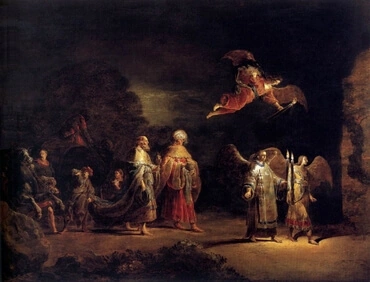Go

In the physical world, the places we inhabit and the distances between them are physical realities, and we have to get our physical bodies through the physical space between to get from one physical place to another physical place. In the spiritual world, however, the "places" we inhabit and the “distances” between them are spiritual realities, which means they are reflections of our thoughts and affections. "Going" from one place to another, then, is a change in spiritual state -- exploring different thoughts and embracing different feelings. Since the Bible is a spiritual book, "going" there also indicates a change or progression in spiritual state, from one mode of thinking and feeling to another mode of thinking and feeling. Obviously, this makes the precise meaning of "go" in the Bible highly dependent on context: Who is going? Where are they going? Why are they going there? Are they following someone or something? Those questions are crucial to the precise meaning. Used on its own, though, "going" represents the normal progression of life, moving through spiritual states as the Lord intends. This has its roots in early Biblical times, when people were nomadic and moved from place to place in a regular progression of life.
Arcana Coelestia # 1672
1672. 'And the kings who were with him' means the apparent truth that goes with that good. This is clear from the meaning of 'kings' in the Word. Kings, kingdoms, and peoples in the historical and prophetical sections of the Word mean truths and the things that belong to truths, as may be confirmed from many places. In the Word a careful distinction is made between people and nation, 'people' meaning truths, 'nation' goods, as shown already in 1259, 1260. Kings have reference to peoples, and not so much to nations. The children of Israel, before they sought to have kings, were 'a nation' and represented good, or that which is celestial; but after they desired a king and received one, they became 'a people' and represented not good or that which is celestial, but truth or that which is spiritual, and this was the reason why this was ascribed to them as a fault in 1 Samuel 8:7-end. This, in the Lord's Divine mercy, will be explained elsewhere. In the present verse, since 'Chedorlaomer' is referred to, and then the phrase 'the kings who were with him' is added, both good and truth are meant - good by 'Chedorlaomer' and truth by 'the kings'. But what kind of good and truth it was when the Lord's temptations first began has been stated above.






